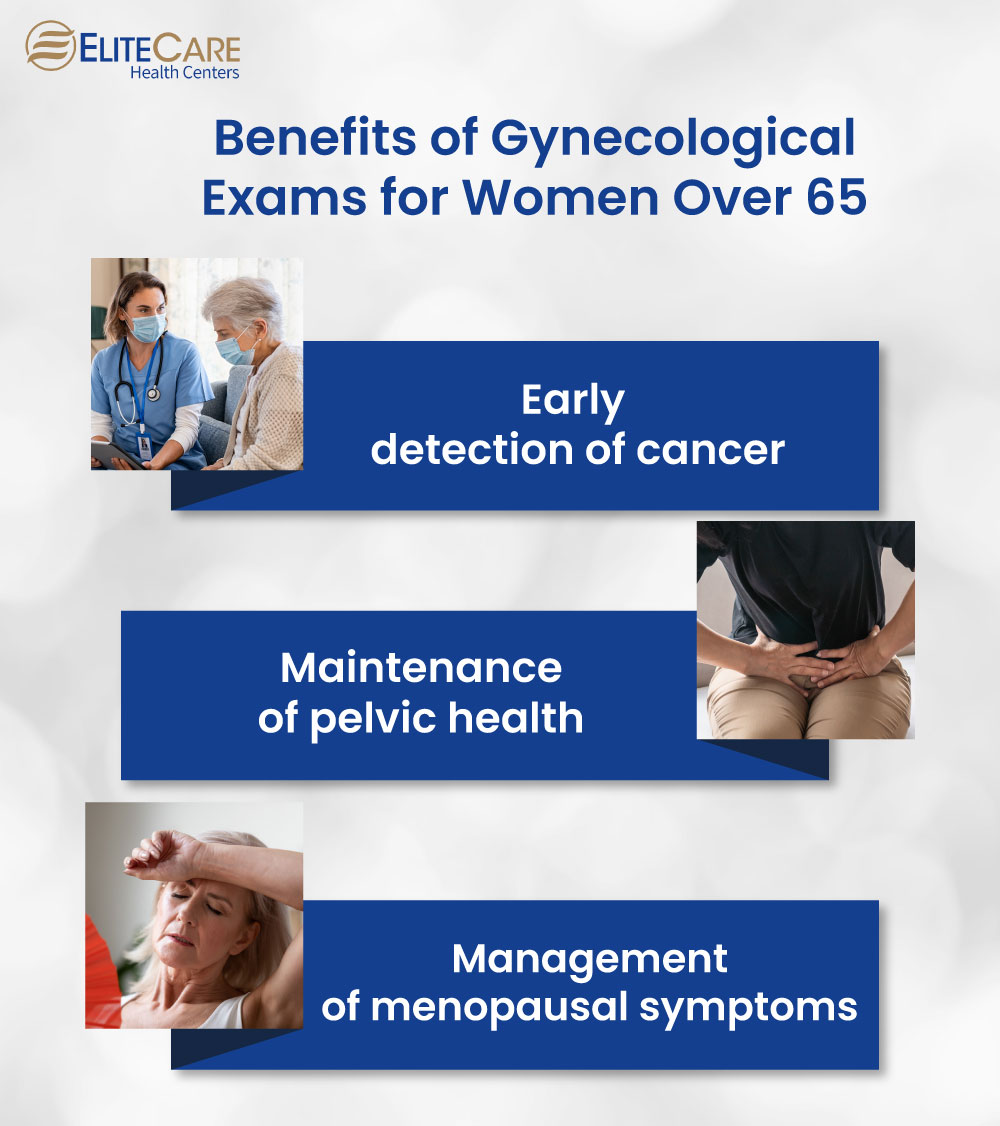
Many women understand the significance of regular gynecological check-ups, but often fail to prioritize them. It’s crucial to emphasize that maintaining gynecological health is just as important for women over 65 as it is for younger women. Regular exams are critical in maintaining reproductive health, even if there are no apparent issues. Despite its importance, women over 65 neglect and do not prioritize these exams. In this blog post, we will share why regular gynecological exams are crucial for senior women, their benefits, and why it is essential to prioritize this aspect of health and wellness.
Benefits of Gynecological Exams for Women Over 65

With age, the body goes through many changes. In childbearing years, the gynecologists typically review the patient’s menstrual history, screens for STIs if the patient is sexually active, and measures the body mass index to prevent foreseeable diseases. Post- menopausal women may not need to see a gynecologist for the same issues.
However, a gynecological exam in women over 65 years, is essential and comes with its benefits, which are as follows:
1. Early detection of cancer and other diseases
A regular gynecology exam is an essential part of the Health Screening Program for senior women. It can help detect any potential health issues early on, which greatly improves the chances of successful treatment. This includes early detection of cervical, endometrial, and ovarian cancers.
2. Maintenance of pelvic and reproductive health
Gynecological exams can help identify any abnormalities, such as lumps, pain, or tenderness. And treat any issues related to pelvic and reproductive health, including incontinence, uterine prolapse, and vaginal dryness.
3. Management of menopausal symptoms
Exams can help women manage the symptoms associated with menopause, including hot flashes, night sweats, and vaginal dryness. A physician can also check for any signs of endometrial hyperplasia, a precancerous condition that can occur in postmenopausal women. Additionally, the physician will perform a breast examination to check for any lumps or irregularities. Based on the exam results, the doctor may recommend lifestyle changes, hormone replacement therapy, or other treatments to manage menopausal symptoms.
What to Expect During A Gynecological Exam

1. Physical examination
The physician will thoroughly examine the pelvic area. This will include a breast exam and a pelvic exam to check the reproductive organs, such as the uterus, ovaries, and cervix. The doctor may also perform a rectal exam to check the rectum and anus. The purpose of the physical examination is to look for any signs of abnormal growths, lumps, or other changes that may indicate the presence of a health issue.
2. Pap smear test
This is a screening test to check for cervical cancer. During the test, a doctor will take a sample of cells from the cervix and send it to a laboratory for analysis. The purpose of the Pap smear is to detect any changes or abnormalities in cervical cells that could be indicative of cancer or a precancerous condition. It is an important part of a woman’s preventive health care, especially after age 65, when the risk of developing cervical cancer increases. Regular Pap smears can help detect cervical cancer early when it is most treatable.
3. Medical history discussion
A healthcare provider will ask about the medical history, including any past surgeries, illnesses, or conditions that may affect the health of an older woman.
4. Review of current medications
The provider will also review the medications currently being taken, including prescription and over-the-counter medications, to check for any potential interactions or side effects that may affect the health. The physician may also recommend changes to current medications based on the patient’s health history and current needs.
Common Concerns and Misconceptions
1. Discomfort and Embarrassment
Fear of discomfort or embarrassment during a pelvic exam is common for many senior women. This fear may stem from previous negative experiences, concerns about the exam procedure, or self-consciousness about one’s body. To address these concerns, it is advised to choose a healthcare provider from a Florida Medical Clinic who is understanding, compassionate, and skilled at performing the exam. The provider should explain the procedure beforehand, use appropriate drapes during the exam, and make accommodations for any physical limitations to make the exam as comfortable as possible.
2. Misconceptions
There is a common misconception that a gynecology exam is unnecessary after a certain age. This is not true. Even after menopause, a woman should undergo regular exams to detect and prevent potential health problems. After menopause, the vaginal walls can become thin and dry, increasing the risk of vaginal infections. Regular exams can help detect and treat these infections.
Takeaway
According to a study, more than 20% of cases of cervical cancer are detected in women over 65 years old. A regular pelvic exam and cervical screening can ensure early diagnosis and significantly increase the chance of quick and complete recovery. An EliteCare healthcare provider plays a crucial role in addressing concerns and misconceptions and providing education and guidance on maintaining good overall health.






